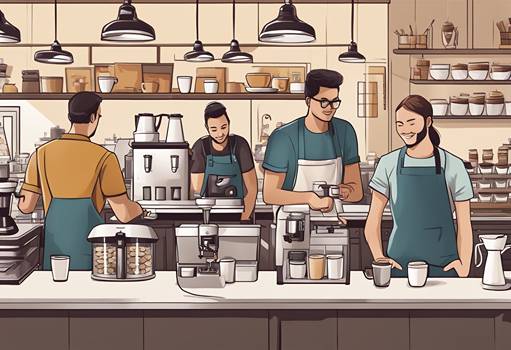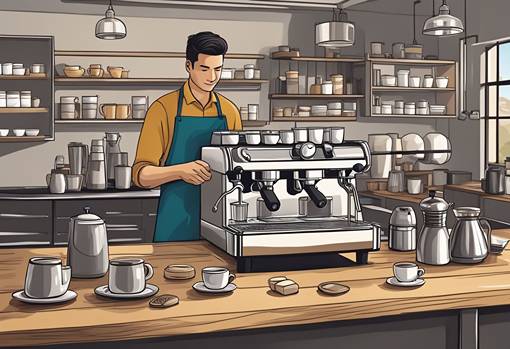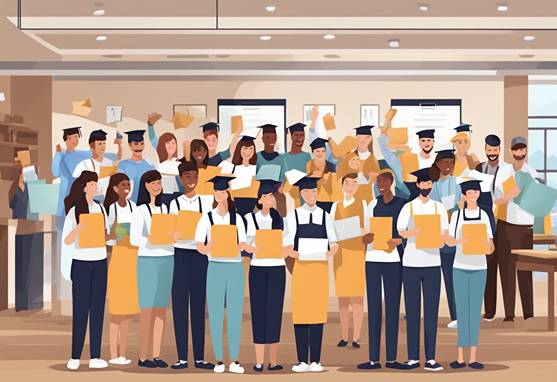Choosing the right barista school can significantly impact your journey towards a successful career as a skilled barista.
Barista schools offer a comprehensive curriculum, providing you with the necessary knowledge of coffee brewing and advanced techniques used in the industry.
By attending a top-notch barista school, you can leverage their hands-on training and practical experience offerings, preparing you for an exciting career in the world of specialty coffee.
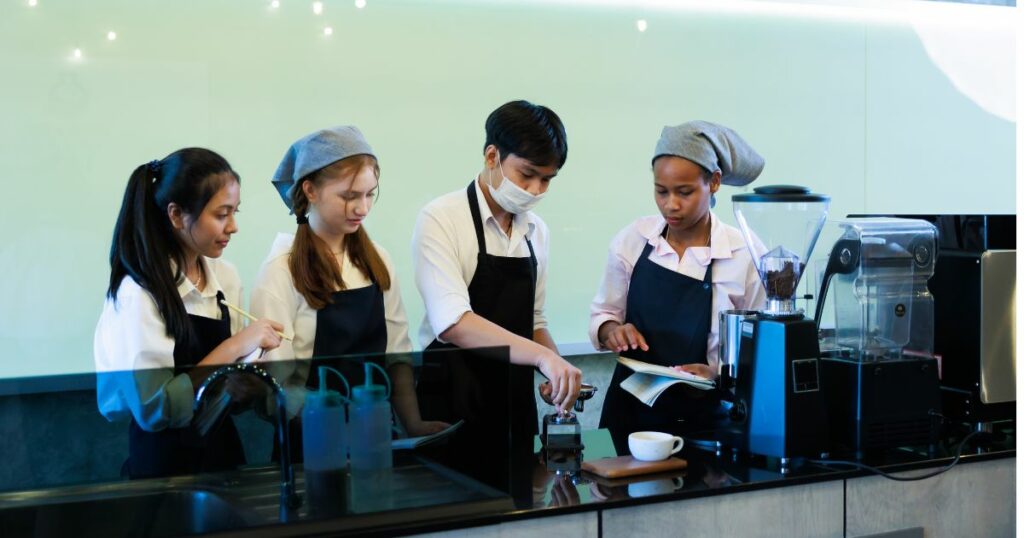
The best barista schools offer a range of programs that cater to different learning styles and skill levels.
With a solid understanding of the fundamentals, you can progress towards mastering advanced skills and build a strong foundation for your career in the coffee industry.
Moreover, regional opportunities and schools cater to the specific preferences of students, with a variety of courses designed to help you excel in your chosen career path.
Key Takeaways
- Enrolling in a top highest barista school accelerates your learning process, providing a strong foundation for a successful coffee career.
- Hands-on exclusively training and practical experience are crucial aspects of any barista school program, preparing you for the real world.
- Various regional opportunities and schools offer a wide selection of courses to suit individual preferences and career goals.
Top 5 Best Barista Schools and Training in the World
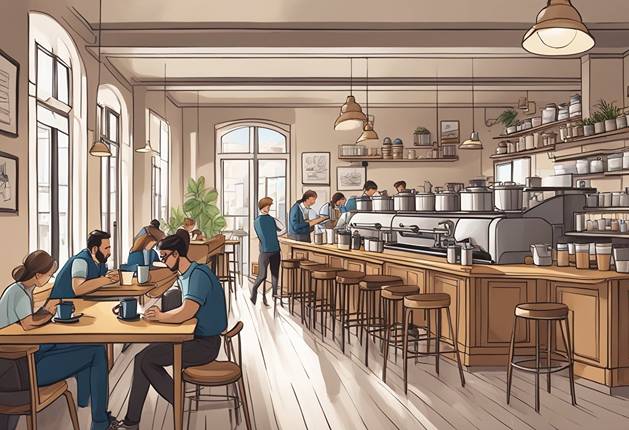
Are you passionate about coffee and looking to enhance your skills at some of the best barista schools in the world?
In this brief section, we will present the top five barista schools where you can receive top-notch education, both online and in-person, to improve your barista skills and earn valuable certifications.
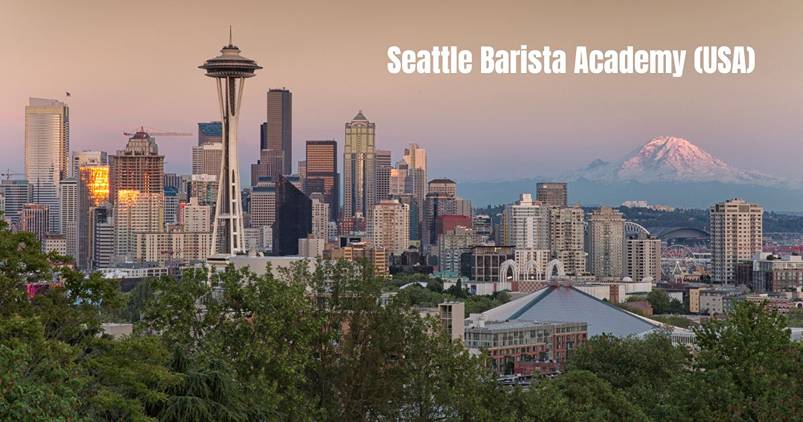
Seattle Barista Academy (USA): Renowned for its diverse courses taught by industry professionals, this academy has a strong emphasis on hands-on training and Specialty Coffee Association (SCA) certifications. You’ll gain practical experience while mastering the essential skills needed to excel as a cafe barista.
Specialty Coffee Association (SCA): Offering a comprehensive barista training program and a structured Coffee Skills Program, the SCA provides education in the art and science of modern coffee craft. Their certification programs span Foundation, Intermediate, and Professional levels, covering various aspects of coffee skills and knowledge.
Bellissimo Coffee Advisors (USA): Highly regarded as one of the top barista schools worldwide, Bellissimo Coffee Advisors offers both online and in-person training courses. Equipping you with fundamental skills and extensive knowledge on coffee techniques, this prestigious school is a go-to choice for aspiring baristas.
The Espresso Academy (Italy): Located in the heart of Italy, The Espresso Academy features a mixture of in-person and online barista training courses. As a student here, you’ll receive a thorough education in the art of espresso, covering everything from coffee history to advanced brewing techniques.
The Barista Academy (New Zealand): Offering a variety of courses for beginners and professionals alike, The Barista Academy in New Zealand emphasizes hands-on learning and practical training. With classes focused on espresso techniques, brewing, and latte art, you are sure to obtain a well-rounded education in the field of coffee.

By choosing one of these highly-regarded barista schools, you’ll be investing in your education and future career in the coffee industry.
Whether you opt for online training or hands-on, in-person courses, you will be sure to enhance your barista skills and knowledge.
Understanding Barista Fundamentals
Introduction to Coffee
Coffee is a complex and fascinating beverage that is enjoyed by millions of people worldwide, it is a commercial drink.
As a budding barista, it’s important for you to know the basics, such as coffee bean types, regions, and roast profiles.
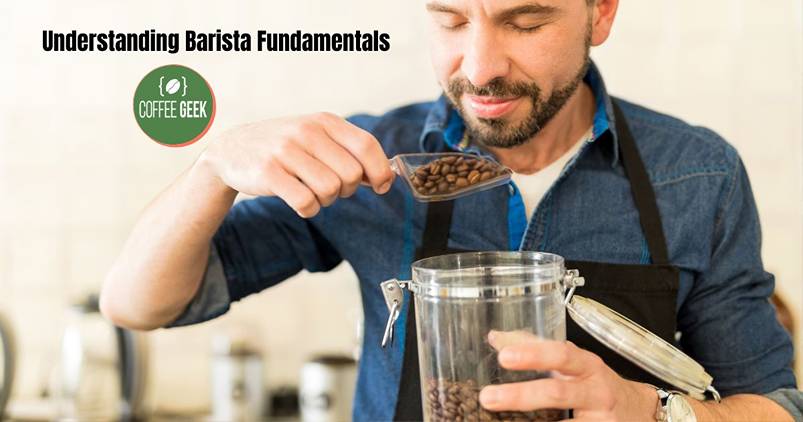
Each type of coffee bean has its own unique flavor characteristics, which are influenced by the soil, climate, and altitude of the regions where they are grown.
By understanding these factors, you can better appreciate the nuances of coffee and better meet the preferences of your customers.
Coffee Brewing Basics
There are several popular coffee brewing methods for you to master as a barista. Some key methods include pour-over, French press, and Aeropress.
The fundamentals of brewing coffee involve the right coffee-to-water ratio, using freshly ground beans, maintaining the appropriate water temperature, and timing the extraction process.
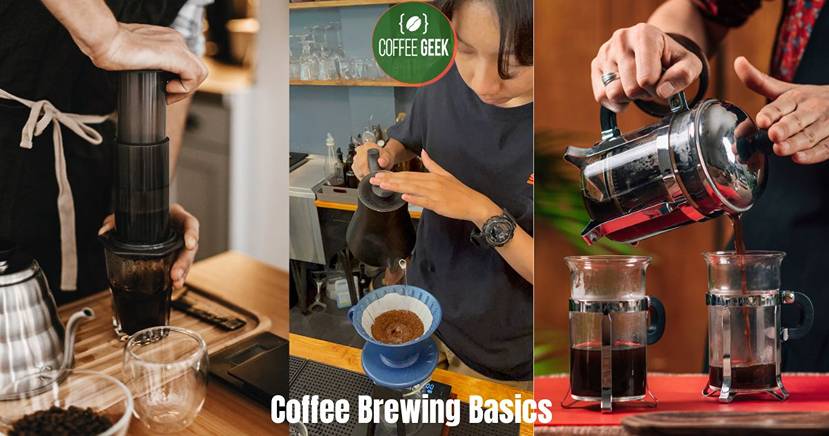
By mastering these techniques, you will ensure that you consistently brew delicious cups of coffee for your customers.
Espresso Extraction Principles
Espresso forms the base for many widely popular coffee beverages, such as cappuccinos, lattes, and americanos.
Mastering the art of espresso extraction requires an understanding of variables such as grind size, dose, temperature, and extraction time.
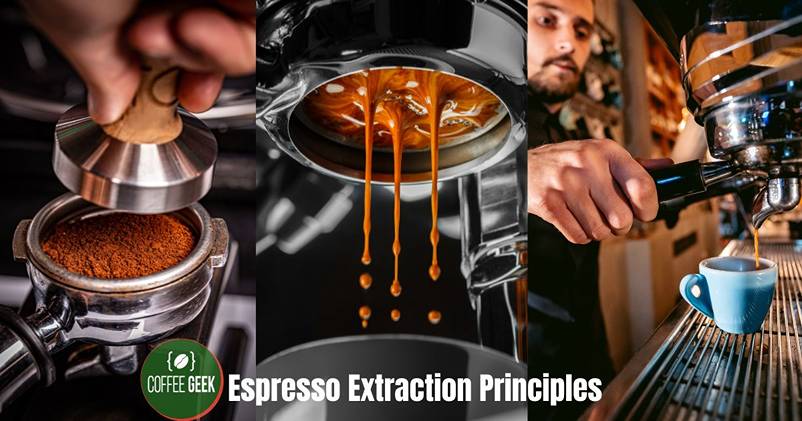
Focusing on the concept of the basic espresso will help you perfect your espresso shots.
The goal is to achieve a balanced and flavorful extraction that highlights the best characteristics of the coffee beans.
- Grind size: Fine, resembling powdered sugar
- Dose: 18-20 grams in a double basket
- Temperature: 200±2°F
- Extraction time: 25-30 seconds
- Yield: 36-40 grams (1.2-1.4 oz) of liquid espresso
Milk Steaming and Latte Art Fundamentals
Milk steaming and latte art are essential skills in any professional barista’s arsenal. When you properly steam milk, it creates a creamy and velvety texture that enhances the flavor and mouthfeel of your espresso-based drinks.
The key to milk frothing is to introduce air while heating the milk, creating microfoam that incorporates into the milk rather than sitting on top of it.

Once you have mastered milk steaming, it’s time to learn latte art basics. Here, you will combine espresso and steamed milk to create visually appealing designs such as a heart, tulip, or rosetta.
The goal is to pour the milk in a controlled manner to create the desired pattern while maintaining the quality of the beverage.
Practicing these barista fundamentals will help you build a strong foundation in coffee, brewing, espresso extraction, and milk steaming, ultimately elevating your skills to become a complete, successful and well-rounded barista.
Advanced Skills Development
Mastering Coffee Roasting
At the core of exceptional coffee is exceptional roasting. Delving into the world of coffee roasting can open up a new range of skills and possibilities in your barista career.
You’ll learn the intricacies of roast profiles, how to manipulate flavor, and achieve consistency.
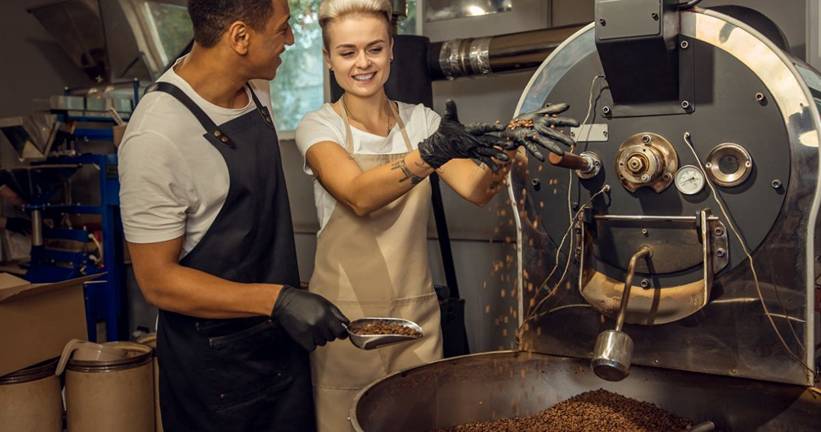
By mastering coffee roasting, you’ll gain a deeper understanding of the entire brewing process, and enhance your ability to create remarkable espresso drinks.
Some top-notch schools like the London School of Coffee provide world-class barista training, which includes coffee roasting.
Cupping and Sensory Analysis
Developing your sensory skills and cupping ability is crucial for any advanced barista.
Coffee cupping allows you to identify, analyze, and evaluate the flavor profile, aroma, and quality of various coffee beans.
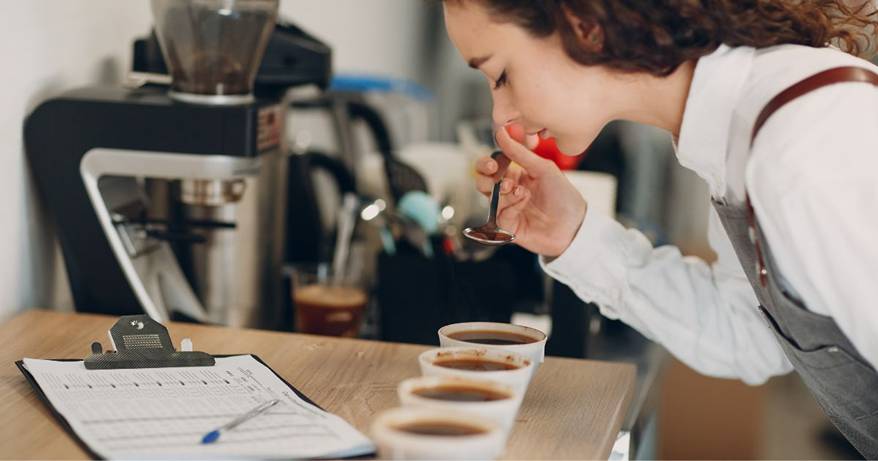
This skill will enable you to select the finest beans for your espresso drinks, ensuring a remarkable experience for your customers.
SCA Education offers comprehensive barista courses that include sensory skills development and cupping training.
Creating Signature Espresso Drinks
Your ability to create signature espresso drinks showcases your creativity, passion, and expertise as a barista.
It is essential to explore and develop innovative recipes that blend different flavors and textures to provide a unique experience.
Experimenting with latte art techniques can also enhance the visual appeal of your espresso beverages, making them more attractive to customers.
Brewing Techniques and Grinder Calibration
In addition to crafting espresso drinks, advanced baristas should familiarize themselves with a variety of brewing methods, such as pour-over, AeroPress, and French press.
By mastering these techniques, you can provide a wide range of coffee experiences to your customers.

An essential aspect of brewing exceptional coffee is understanding the grinder calibration. It involves precision in grind size and adjusting the grinder according to varying factors like bean type and humidity.
This allows you to extract the optimum flavor and ensure a consistently high-quality cup of coffee.
By focusing on these advanced skills development areas, you will elevate your barista skills to a professional level and excel in your promising coffee career.
Building a Career in Coffee
Navigating the Specialty Coffee Industry
The specialty coffee industry is a rapidly growing and evolving sector. By pursuing a career in this field, you’re entering an exciting world of opportunity.
Start by immersing yourself in the industry’s culture, attending events and connecting with other coffee professionals.
One crucial step is enrolling in a prestigious barista training school, like the Seattle Barista Academy, to gain the skills and knowledge you need to excel.
Expanding your network will open up job opportunities and help you stay up-to-date on the latest trends.
From Barista to Business Owner
Once you’ve mastered the basics, consider taking your coffee career to the next level by starting your own business.
This journey begins with crafting a sound business plan and refining your understanding of business management.
Seek additional training and certification by organizations such as the Specialty Coffee Association to gain practical knowledge in various aspects of operating a coffee shop.
Remember, becoming a successful business owner requires an entrepreneurial mindset and a commitment to continuous learning.
- Gain experience as a barista.
- Develop a solid business plan.
- Pursue additional certifications.
- Keep learning and evolving.
Employment and Building a Barista Team
As your coffee business grows, so does the need for a skilled barista team.
Hiring talented individuals who share your passion for coffee is crucial as they’ll help represent your brand.
Pay attention to:
- Barista experience and training.
- Personality and customer service skills.
- Work ethics and team dynamics.
Ensure your team members receive ongoing training to stay current with the ever-changing coffee industry.
Providing them with opportunities to attend workshops, conferences, and competitions will boost their skills and foster a sense of loyalty to your business.
Maintain open lines of communication and create a supportive work environment to foster growth and productivity within your team.
Embracing the challenges and rewards of a career in the specialty coffee industry can lead to tremendous personal and professional fulfillment.
By dedicating yourself to learning and growth, you can build a thriving coffee business and loyal barista team, taking your passion for coffee to new heights.
Hands-On Training and Practical Experience
Workflows and Operations in Coffee Shops
As an aspiring barista, it’s essential to gain hands-on training and practical experience.
One effective way to achieve this is by working at local coffee shops where you can learn the ins and outs of daily operations.
Through this kind of immersive training, you’ll become familiar with the workflow in a coffee shop, from order-taking to drink preparation and customer service.
Understanding the different stages of a coffee shop’s workflow will enable you to become efficient in carrying out your tasks and provide excellent service to customers.
You’ll learn how to navigate various roles, such as taking orders, operating the espresso machine, and managing inventory.
Equipment Maintenance and Technical Skills
Another crucial aspect of being a successful barista is mastering the technical skills necessary to operate and maintain coffee equipment, particularly espresso machines.
Schools like the Seattle Barista Academy emphasize a hands-on approach when teaching their students these skills.
By gaining practical experience, you’ll be better equipped to handle the nuances of different machines and make necessary adjustments depending on factors such as grind size, water temperature, and extraction time.
Furthermore, learning how to maintain equipment will not only extend their lifespan but also ensure that the coffee you serve is consistently of high quality.
Remember, hands-on training and practical experience are invaluable for building your barista skills.
Whether it’s mastering the workflow of a coffee shop or learning the intricacies of equipment maintenance, immersing yourself in the world of coffee will help you become a true professional in the industry.
Regional Opportunities and Schools
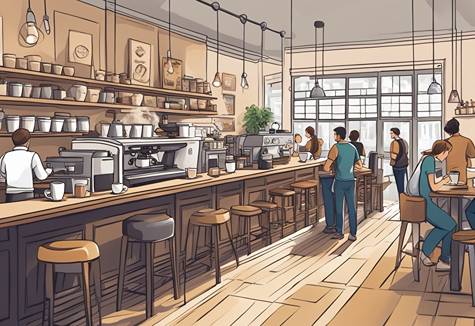
United States Barista Academies
In the United States, several top-tier barista academies offer quality training and education for aspiring baristas.
Among the most well-known institutions is the Seattle Barista Academy, which offers one-on-one professional training using a hands-on approach.
Some other notable schools in various locations include:
- New York: Counter Culture Coffee, known for its professional development courses on coffee brewing, espresso, and customer service.
- Los Angeles: Bellissimo Coffee Advisors, providing comprehensive barista courses covering equipment operation, latte art, and much more.
- Houston: Texas Coffee School, offering a variety of barista training for different skill levels, including beginner, intermediate, and advanced classes.
- Portland, OR: Oregon’s Midwest Barista School offers in-depth knowledge on coffee brewing, roasting, and latte art.
Some academies even extend their services throughout various regions, such as Counter Culture Coffee with training facilities in New York, Miami, Los Angeles, and several other cities.
International Perspectives on Barista Training
Expanding your horizons beyond the United States can also lead you to several renowned international barista schools.
One such institution is the International Barista Coffee Academy (IBCA) in Arizona.
The IBCA is considered one of the most prestigious barista overall training schools in North America and is the only training center authorized to offer the SCAE Diploma System in the Americas.
Other schools of note outside the U.S., but still within the broader North American region, include The Barista Academy in Canada.
This school provides comprehensive barista courses that cover various aspects of coffee brewing, latte art, and customer service.
As you explore these regional opportunities and schools, remember to research each academy’s unique offerings, locations, and training programs to determine the best fit for your barista education and career goals.
| School Name | Location | Program Offerings | Accreditation |
|---|---|---|---|
| Barista Academy | New York, NY | Barista Basics, Advanced Espresso | Specialty Coffee |
| Espresso Excellence | San Francisco, CA | Professional Barista, Latte Art | SCAA |
| Bean Masters Institute | Seattle, WA | Barista Certification, Coffee Science | SCAE |
| Brew University | Portland, OR | Master Barista Program, Coffee Roasting | Barista Guild |
| CoffeeCraft Academy | London, UK | Barista Fundamentals, Coffee Tasting | SCA |
| Artisan Coffee Institute | Melbourne, Australia | Artisan Barista Course, Cupping | ASCA |
Next Steps
Embarking on your barista journey requires dedication and passion for crafting the perfect cup of coffee from coffee roasters.
It is essential to choose the right barista training school to build the necessary skills and knowledge in coffee making.
To begin, research extensively to find a school that aligns with your aspirations and learning style.
Some of the top barista training schools in the U.S.A are The Seattle Barista Academy and programs featured on Portafilter’s list of the best barista schools in the world.
These schools offer in-depth, hands-on training, ensuring you master the art of coffee making.
As you work towards becoming a professional barista, consider seeking a barista certification.
This certification serves as proof of your skills and commitment to the coffee industry, making you stand out among other candidates to potential employers.
Always be open to learning and improvement. Here are some valuable tips to follow on your journey:
- Experiment with different coffee beans, brewing techniques, and equipment.
- Stay up-to-date with industry trends and innovations.
- Network with other professionals and enthusiasts.
Following these tips will not only enhance your skills but also broaden your understanding of the diverse world of coffee.
And remember, the key to becoming successful in any field, including the world of baristas, is to maintain your passion and persevere through any challenges.
Lastly, as you become proficient in your craft, don’t hesitate to showcase your skills to potential employers.
A well-thought-out résumé, highlighting your experience, training, and certification, could open the doors to a fulfilling and enjoyable career in the thriving coffee industry.
Good luck on your journey to becoming a top-tier barista.
Frequently Asked Questions

What are the top barista training programs internationally?
Internationally, there are various renowned barista training programs.
Some of the top ones include the Seattle Barista Academy in the United States and the Italian Barista School in Italy.
Always research and choose a reputable program that suits your needs.
How do I locate quality barista schools near my location?
To locate quality barista schools near you, start by searching online for courses and schools in your area.
Websites like Portafilter and The Spruce Eats provide helpful information on various programs.
Additionally, ask for recommendations from local coffee shops, as they may have insights on reputable schools.
What certifications are most recognized in the barista industry?
In the barista industry, there isn’t a single certification that is universally recognized.
However, programs accredited by Specialty Coffee Associations (SCA) are well-regarded in the industry.
It’s recommended to pursue certifications from reputable institutions, as they hold a higher value in the job market.
Are there specialized training courses for beginners in the barista field?
Yes, many barista training programs offer specialized courses for beginners.
These courses are designed to help novices learn essential barista skills such as brewing techniques, customer service, and basic latte art.
What is the expected cost for attending a barista training course?
The cost of attending a barista training course can vary depending on the program, location, and the duration of the course.
On average, you can expect to pay between $500 and $2,000 for a comprehensive barista training course.
Online courses might be more affordable, while in-person courses can be more expensive due to equipment and facility costs.
What level of certification should a professional barista attain?
The level of certification a professional barista should attain depends on the individual’s career goals and the specific requirements of the coffee industry in their region.
Basic certifications can provide fundamental knowledge and skills, while higher levels of certification offer advanced techniques and a more in-depth understanding of the barista craft.
It is advised to continue learning and upgrading your skills throughout your career to stay competitive in the industry.


